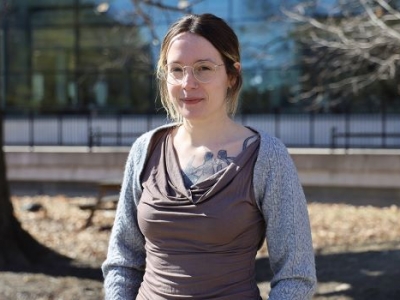“The event was a powerful illustration of the top quality of the Technology Innovation Management (TIM) program, which realizes key characteristics of Carleton’s graduate education – interdisciplinarity, community engagement, technology entrepreneurship, and ideal preparation for the job market,” said Matthias Neufang, dean of the Faculty of Graduate and Postdoctoral Affairs. “The theme of cybersecurity further exemplifies Carleton’s particular institutional strengths in data science and security.”
Frincke leads the only “in-house” research organization in the U.S. intelligence community, aimed at creating breakthroughs in mathematics, science and engineering to support NSA. The research spans a broad cross-section of computer security, both open and classified, with a particular emphasis on infrastructure defence and computer security education.
During her talk, Frincke explained that as a world science and technology leader, the Research Directorate engages with leading industries, universities and national laboratories to both advance core competencies and leverage work in overlapping disciplines. Through the NSA’s Technology Transfer Program, the Directorate licenses and shares internally developed technologies with industry, academia and other government agencies.
Attendees also celebrated the outcome of a second collaborative initiative, an e-book on cybersecurity with 15 articles and a foreword by Eros Spadotto, executive vice-president of Technology Strategy at TELUS. Dan Craigen, a co-editor of the book and a Carleton alumnus, said the articles were drawn from five special TIM Review issues on cybersecurity published from July 2013 to January 2015 as part of an effort to build cybersecurity intellectual capacity.
Authors from industry, academia and government contributed to the content, reflecting a multi-sector, geographical and ethnic diversity.
“Technology is not a silver bullet; we need multidisciplinary collaborative approaches to make a difference,” said Craigen. “This problem is bigger than any one technology or discipline can address on its own.”
The final part of the event celebrated entrepreneurial initiatives at three small Ottawa-based companies where cybersecurity is critical to their success. Two of these companies – Denilson and Crack Semiconductor – belong to the recently announced Lead-to-Win Cybersecurity Hub, in which members, while pursuing their own corporate agendas, collaborate with other Hub partners to enrich their offerings and increase their global attractiveness.
“Denilson is a company in the Carleton-led Accelerator that develops mobile payment solutions for retail businesses that enable employees to process credit card payments with their mobile devices,” explained Ned Nadima, founder of Denilson and a student in Carleton’s TIM program.
“The TIM program is unique because it provides entrepreneurial students a strong foundation for building high-growth technology ventures which positively contribute to the local economy.”
Art Low is the founder of CrackSemiconductor and an alumnus of the TIM program. Low explained that he had the idea for his company’s new offering on secure middleware called Nebula during a brainstorming session with various experts organized by TIM Director Tony Bailetti. “Nebula provides the enterprise with a highly secure messaging infrastructure which is the foundation for advanced cybersecurity innovations as cloud computing and the ‘Internet of Things’ become mainstream,” said Low. “We are using Nebula to develop incredibly complex distributed systems with top security at the core.”
Michael Thomas, vice-president of Software Engineering at Bedarra Research Labs, presented the company’s recently released Big Data product called Ivy and demonstrated an application of the company’s tool.
The event concluded with Bailetti highlighting the intellectual and industrial cybersecurity capabilities that exist in Canada’s Capital Region.
“I am proud of the TIM program’s role leading the launch of an initiative to make Canada a global leader in cybersecurity over the last two years. Recently, the leadership of this initiative has been handed over to industry where it belongs,” said Bailetti.




